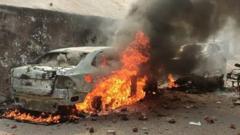Sambhal city, located in Uttar Pradesh, is under heightened alert after violent clashes erupted on Sunday, claiming the lives of three individuals and injuring many others. The unrest ensued during a court-mandated survey of the Jama Masjid, a mosque dating back to the Mughal era.
Protesters engaged in violent actions against the police, reportedly torching vehicles and throwing stones, leading to a significant police response. In light of these events, authorities have detained 21 people and temporarily suspended internet services while also closing schools in the region.
The survey was initiated following a petition that asserted the mosque was constructed on the remnants of a demolished temple. Videos circulating on social media depict a chaotic scene with debris scattered across the vicinity, including slippers, bricks, and stones. Protesters maintain that the police fired upon them, resulting in civilian casualties, a claim denied by law enforcement officials.
Superintendent of Police, Krishan Kumar, stated, "No weapons were used that could take anyone's life," dismissing allegations of police brutality. Tensions had been mounting in Sambhal since Tuesday when the local court mandated the controversial survey of the Jama Masjid, which has historical significance linked to claims of temple destruction during the Mughal era.
The political climate in Uttar Pradesh, governed by the Bharatiya Janata Party (BJP), has heightened scrutiny concerning religious disputes, particularly those involving mosques. In response to the clashes, Deputy Chief Minister Brajesh Pathak stressed that individuals must not take the law into their own hands and confirmed that investigations are underway.
Mahmood Madani, the president of Jamiat Ulama-i-Hind, condemned the disputes surrounding religious sites, arguing they transgress Indian legal statutes. The escalation of violence in Sambhal reflects broader tensions over religious identity and historical grievances in the country, suggesting that such disputes are far from resolution.






















